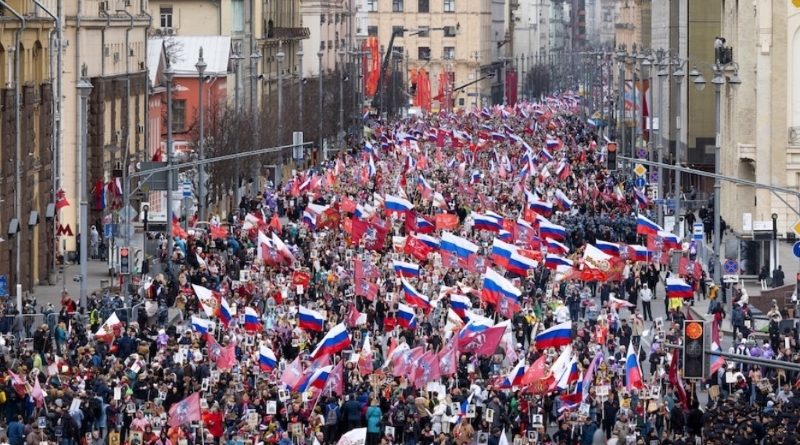Russia’s possible futures
By Daniel W. Drezner, Professor of International Politics at the Fletcher School of Law and Diplomacy at Tufts University
2022 has been a dark year for the Russian Federation. That does not mean a new Cold War.
Monday was Victory Day in Russia, when the country commemorates the Soviet Union’s defeat of Nazi Germany in World War II. Many Russia watchers, myself included, wondered whether Russian President Vladimir Putin would use his Victory Day speech to either declare victory or ramp up the “technical military operation” in Ukraine via a general mobilization.
In the end, Putin’s speech did none of these things. My Post Opinions colleague Max Boot concluded, “Putin was defiant but subdued, trying to portray Russia’s unprovoked attack on Ukraine as a preemptive response to a looming Ukrainian invasion of Russia. It was ludicrous and pathetic — but also strangely reassuring.” Putin appears to have decided that Russia’s sanctions-battered economy — as well as his approval numbers — would take too big a hit with minimal upside. Or, as the New York Times’ Anton Troianovski reported, Putin “remains cautious about demanding too much from regular Russians.”
This leaves us with a conflict in which Russia’s ability to go on the offensive is waning by the hour and Ukraine’s weaponry grows more advanced by the day. At best, maybe Russia can manage a continued frozen conflict in which, as the World Bank recently noted, Ukraine suffers far more than Russia. Like Boot, most commentators expect that Putin will be around even as the war festers.
The hard-working staff here at Spoiler Alerts mostly agrees with that sentiment. And yet, there are signs that Russia’s prosecution of the war, and Putin’s hold on power, might be less sustainable than meets the eye. In a world in which Russian generals are turning on one another, how viable is Putin’s ability to stay in power?
To be as clear as possible: I am not saying that the United States should be fomenting regime change in Russia. U.S. officials should certainly not pop off about it. Rather, I am wondering whether Putin’s war of choice in Ukraine might be more destabilizing within Russia than is commonly believed.
As time passes, Russia’s economy will become a bigger and bigger mess. The economic sanctions in place have hurt Russia’s economy enough for the Russian government to stop publishing certain economic statistics in an effort to conceal the economic damage. A recent sanctions overview by Vox’s Jen Kirby concludes, “One thing is clear:Over time, these sanctions will likely make it harder for Russia to rebuild its tanks, manufacture cruise missiles, and finance a war. It will also make it harder to produce food and make cars.”
Meanwhile, Russia continues to hemorrhage human capital. According to the Moscow Times, “More than 3.8 million Russians have left the country in the first three months of 2022, according to data from Russia’s Federal Security Service (FSB) published this week.” Some of this reflected standard business travel, but a much higher number than usual fled to other countries of the former Soviet Union. The report concluded, “FSB agents have started asking the relatives of Russians who have fled the country to persuade the new emigres to return,” which suggests that this exodus is causing some harm.
Politico’s Nahal Toosi further reports that U.S. officials are “scrambling at embassies worldwide and even along the U.S.-Mexico border” to cope with Russians trying to enter the country. This suggests something more than ordinary business travel.
Some observers point to this exodus as a sign that Putin will stay in power. If potential dissidents are exiting rather than exercising their voice, then surely the Russians who remain will be either quiescent or supportive of Putin? Except that my Post colleague Anthony Faiola reports that ordinary Russians are bypassing state censorship of the Internet through virtual private networks, or VPNs: “Since the war began in late February, VPNs have been downloaded in Russia by the hundreds of thousands a day, a massive surge in demand that represents a direct challenge to President Vladimir Putin and his attempt to seal Russians off from the wider world. By protecting the locations and identities of users, VPNs are now granting millions of Russians access to blocked material.” Putin’s effort to present a closed-off portrait of the war seems to be imperfect at best.
None of this suggests that Putin is about to fall. It does suggest, however, that Putin’s effort to re-Sovietize Russia is both incomplete and costly. For all the talk about the United States needing to prepare for a Cold War, it might make sense to prepare for a vastly weakened Russian government as well.
This piece is republished from The Washington Post.

